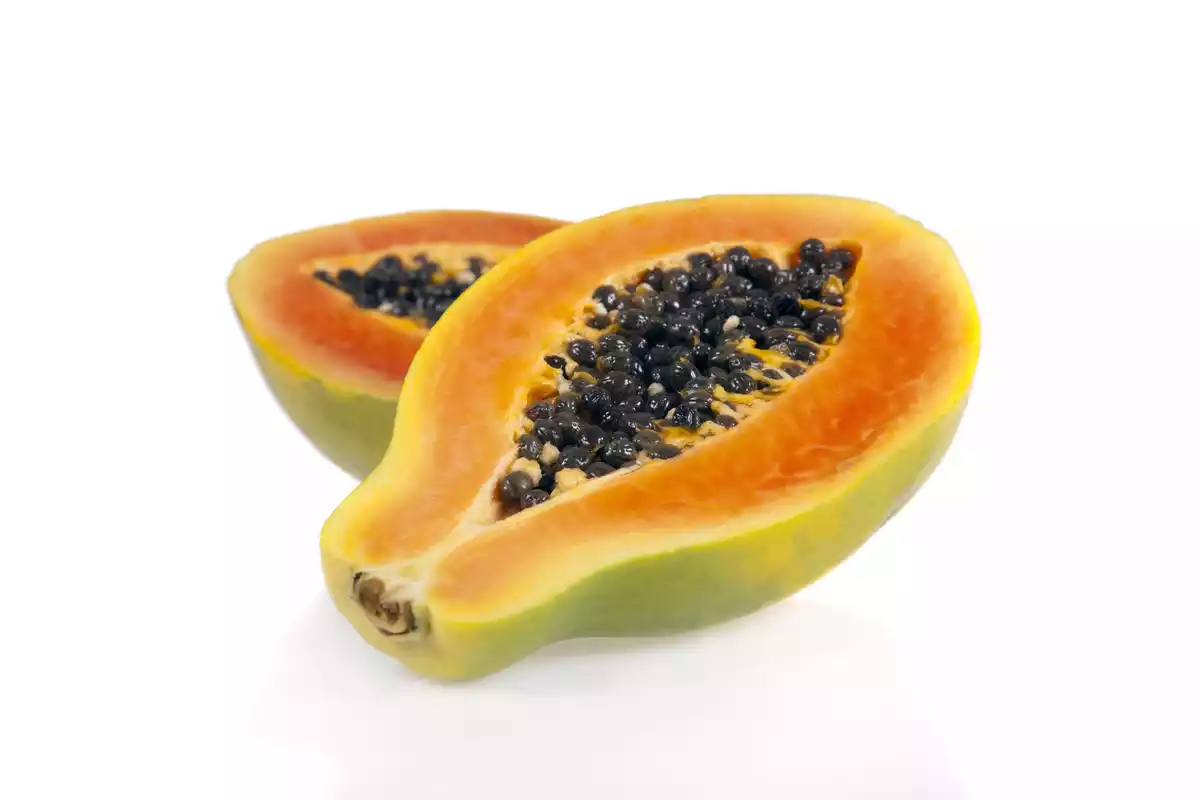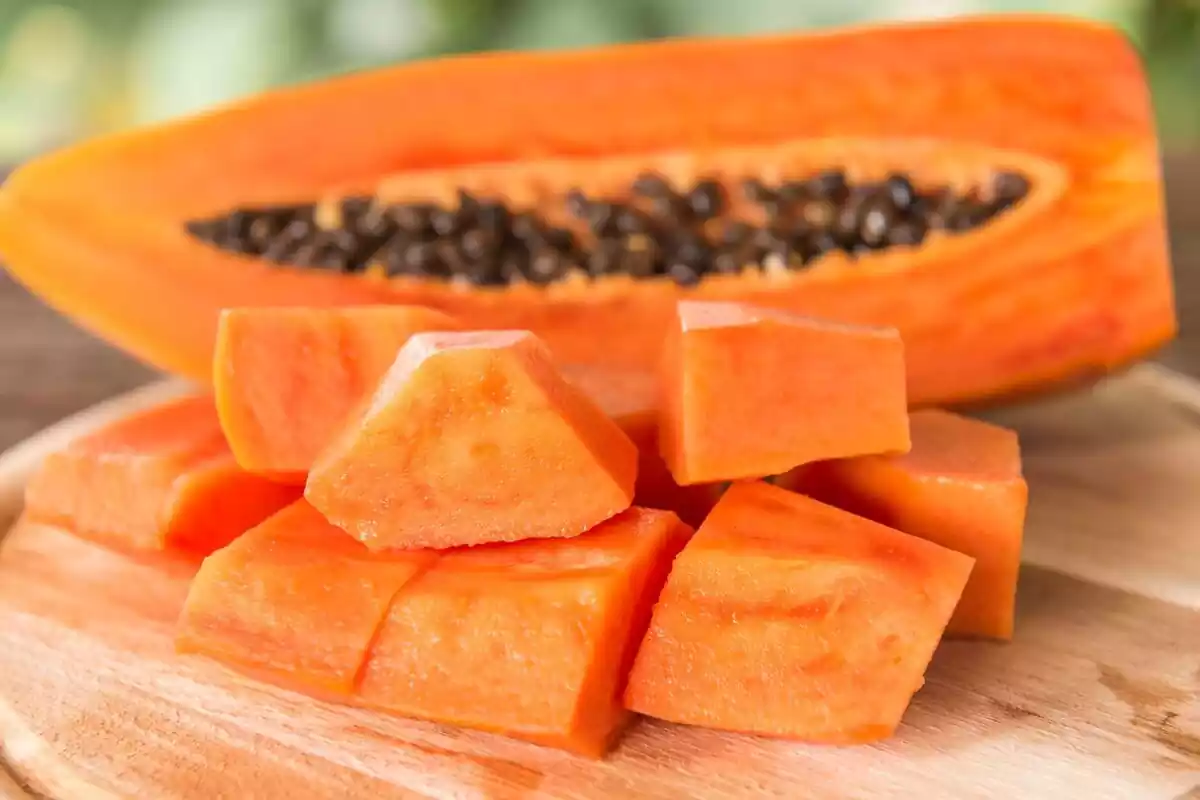In the last years, tropical fruits such as papaya, mango, guava or passion fruit, have acquired considerable popularity in the whole world. The reasons are the striking colors, the unusual flavor and the refreshing sensation that characterizes these fruits.
Apart from all these distinctive traits, tropical fruits also have innumerable health benefits. In this article, we’ll talk about one of the most significant tropical fruits: papaya. We will talk about its properties and benefits which are backed up by scientific evidence.
What is papaya?
Papaya is a fruit whose plant belongs to the Caricaceae family. The papaya tree is small, it has very few branches, and it has a single stem that can reach 10 meters high.
This fruit is from the American tropic –in particular from the south of Mexico and Central America because it needs tropical climates for it to grow.
Although some years ago it was an exotic fruit that few people knew about and difficult to find, nowadays its sweet flavor, its striking colors and the great variety of health benefits it has, have made this curious fruit a very popular food that we can find all year.
How to eat papaya
The pulp inside this tropical fruit is distinguished by its softness and fleshiness, which makes it ideal to be used in a wide variety of papaya recipes, from juices and smoothies to sauces and dressings, or as one more ingredient of salads.
If we open one of these fruits we can see that it harbors a large number of seeds inside and, while it is true that the seeds are edible, they have an intensely bitter taste.
Benefits
Although many more are probably attributed to it, not all the benefits associated with papaya are guaranteed and supported by scientific evidence.
In consequence, in this article, we have highlighted the papaya health benefits that have been confirmed by science and that are supported by the scientific community.
1. It’s rich in nutrients
In a small papaya, of about 150 grams, we can find the following nutrition facts:
- Calories: 60
- Proteins: 1 gr
- Fiber: 3 gr
- Carbohydrates: 15 gr
- Vitamin C: 157% of the Recommended Daily Allowance (RDA)
- Vitamin A: 33% of the RDA
- Vitamin B9 (folate): 14% of the RDA
- Potassium: 11% of the RDA
It also has small quantities of calcium, magnesium, vitamin B1, B3, B5 and K, and some natural antioxidants known as carotenoids. These last ones are also in other fruits and vegetables, but it has been observed that the organism absorbs them better when they come from this fruit.
2. It can improve digestion
The papaya enzyme is in its pulp, and it's known as papain. This molecule can make proteins easier to digest.
According to the tropical population’s traditions, it is considered a remedy for constipation and some symptoms of the irritable bowel syndrome. This idea is reinforced by laboratory studies that have proven that people who consume this fruit frequently experiment a significant improvement in constipation and abdominal swelling symptoms.
3. It has antioxidant effects
As we have previously said, it is rich in some antioxidants known as carotenoids. The main beneficial effect of carotenoids comes from its capacity to neutralize the free radicals that oxidize our organism.
Some studies have found that this fruit, especially if fermented, can reduce the oxidative stress caused by free radicals in elderly people and patients with prediabetes, mild hypothyroidism or liver disease.
4. It improves the heart health
Increasing the intake of papaya in our diet can be very beneficial for the health of the heart. The lycopene, an antioxidant molecule, and vitamin C can help prevent some heart diseases.
Also, the antioxidants contained in this tropical fruit can protect our heart and increase the possible protective effects of high density (HDL or "good") cholesterol.

5. It prevents asthma
According to investigations, the risk of developing asthma is considerably lower in people who consume a large number of specific nutrients; one of them is beta-carotene or carotenoids.
As we already know, papaya is an excellent source of carotenoids, which are better absorbed when they are ingested with other fruits or vegetables.
6. It fights inflammation
Inflammation, both temporary and chronic, is a risk factor for many diseases. Thanks to laboratory studies, we now know that fruits and vegetables with many antioxidants help reduce inflammatory markers in the body.
7. Prevents visual deterioration associated with age
Although this information is still being studied, it’s believed that thanks to its antioxidants, papaya plays a protective role in ocular health, avoiding the known spotty degeneration that appears with aging.
On the other hand, it has been shown that an increase in fruit intake in general decreases the risk and progression of this disease or condition relative to sight.
8. It protects against skin damage
Apart from favoring the healthy maintenance of our organism, this fruit can also help our skin to be boosted.
The action of antioxidants such as lycopene and vitamin C protects our skin and can help reduce the signs of aging.
9. It could be useful against cancer
Research on the properties and benefits of lycopene present in this fruit and many other fruits suggest that this molecule could reduce the risk of cancer, as well as be beneficial for people who are being treated for this disease.
It is hypothesized that the ability of papaya to fight cancer could be related to its action in reducing free radicals that contribute to the development and progression of cancer.
However, more research is required to confirm that it is beneficial against cancer, both in its prevention and, particularly, in controlling its development.
References
Mozaffarieh, M., Sacu, S., & Wedrich, A. (2003). The role of the carotenoids, lutein, and zeaxanthin, in protecting against age-related macular degeneration: a review based on controversial evidence. Nutrition Journal, 2(1), 20.
Wu, K., Erdman, J. W., Schwartz, S. J., Platz, E. A., Leitzmann, M., Clinton, S. K. & Giovannucci, E. (2004). Plasma and dietary carotenoids, and the risk of prostate cancer. Cancer Epidemiology and Prevention Biomarkers, 13(2), 260-269.
